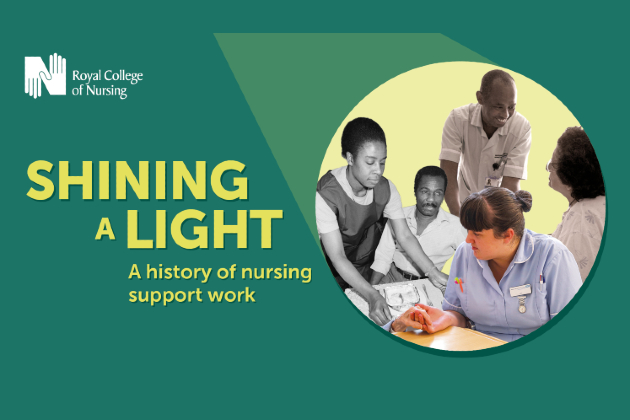As the RCN welcomed free health care for all for the first time, our member journal back then, the Nursing Times, dedicated many column inches to the new National Health Service. Positives were examined alongside possible pitfalls, with processes and management structures explained in detail
A welcome change
With one month to go, member Mary Witting shared her thoughts on why the new NHS was reason to be proud:
“One of my earliest recollections as a small child is of overhearing a discussion between my parents about the illness of an acquaintance. I asked if she was being attended by a doctor, and was told she could not afford it. I can remember well the shock (…) of realising that a woman might be ill and in pain, without help owing to lack of money.
It is a great time to be alive
“As a district nurse before the war I was to know more of this tragedy of the poorer people in our community (…) All of us who worked among them suffered the misery of frustration because we could do so little to help.
“And now, after July 5th 1948, all this is altered. However much the machinery may creak as it first begins to work, this great principle has been accepted. Never again need any one of us suffer disease through lack of money (…)
“Let us be proud that a country still poor after war has taken this courageous step (…)
“We are a part of the service. It is a great time to be alive.”
Opportunities
As the start date drew closer, Miss P Loe MBE, matron at St James����ֱ���s Hospital for Mental and Nervous Diseases, looked forward to the opportunities the NHS would offer to nursing and patient care. Her article in 3 July issue of Nursing Times welcomed the nursing advisory committees that would give the profession a stronger voice and that some boards were looking to appoint chief nursing officers ����ֱ��� although she described the salary on offer as ����ֱ���rather parsimonious����ֱ���.

She also saw great potential in her own field: ����ֱ���In my own opinion the greatest opportunities in nursing in the future lie in mental hospitals. This service, while already doing so much, will, under the new regime, be able to extend and improve enormously. Accommodation will be improved, amenities for both patients and staff increased and equipment modernised and supplemented.����ֱ���
Making up the numbers
Of course, the new health service was not entirely without issues and one particular concern remains just as familiar today. Fears about increased service demand from the public meant that safe staffing levels were a focus for the College.
The lead article in the 5 June issue of Nursing Times, ����ֱ���Making the Service a Reality����ֱ���, said: ����ֱ���All groups of nurses are in short supply at the moment: the situation cannot improve suddenly on July 5, and, there is, of course, the fear it may become worse if the public demand as their right, more service than at present expect. The Minister is apparently expecting a chorus of complaint to ����ֱ���echo through Whitehall����ֱ��� after July 5, but has not indicated how he will deal with those complaints which depend for their remedy on adequate numbers of staff.����ֱ���
Too great a responsibility and burden of work is placed on the few trained staff
The article says recruitment and retention must be tackled, suggesting careful selection of students to reduce the ����ֱ���wastage rate����ֱ���, and recommends improving both the practical conditions and ����ֱ���personnel relations����ֱ��� for the profession.
It also highlights the rate at which nurses were leaving hospital work, stating: ����ֱ���Too great a responsibility and burden of work is placed on the few trained staff who remain, so that they in turn give up hospital work ����ֱ��� and in a great many cases against their inclinations ����ֱ��� because they feel they cannot go on with work of such importance when they know it cannot be done as well as it should be.����ֱ���

People power
Reservations aside, the College knew that one of the NHS����ֱ���s greatest strengths would be its people, saying, ����ֱ���the National Health Service may well be what the nurses make it; their spirit and their enthusiasm will permeate and condition the whole.����ֱ���
 A nursing study group c1948 (QNI)
A nursing study group c1948 (QNI)
But while free services were a radical change, the College also acknowledged that for many it was just another day at work: ����ֱ���The doctors, nurses, dentists, physiotherapists, almoners, ����ֱ���back room����ֱ��� research workers and many others, will be doing on the morning of Monday July 5, the same work for community health as they were doing during the previous week. It is their health service. They will make it a success.����ֱ���
Find out more
RCN History of Nursing Forum
If you're an RCN member interested in nursing history, our History of Nursing Forum is involved in a range of projects to conserve nursing's past and discover more about the people who were part of the profession. Find out more.








